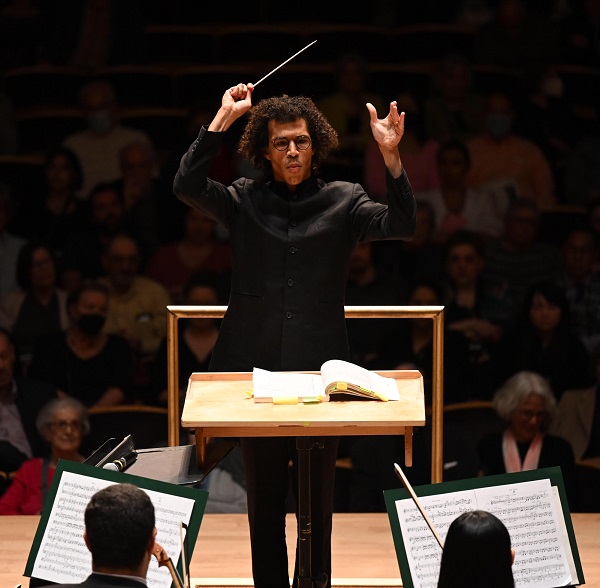Abduraimov’s pianism the highlight of Heyward’s return to BSO podium

Music director-designate Jonathon Heyward conducted the Baltimore Symphony Orchestra Thursday night in the Music Center at Strathmore. Photo: Maximillian Franz
Last summer the Baltimore Symphony Orchestra brought its search for a music director to a surprising conclusion. After not much of a search, the position went to South Carolina-born conductor Jonathon Heyward, who will take the reins officially this coming September. On Thursday night in the Music Center at Strathmore, he returned to the podium for a rather staid program: two Russian blockbusters preceded by a contemporary work.
The hire has generated extensive goodwill among the audience and the musicians, judging by the enthusiastic speech given by BSO keyboard player Lura Johnson and the warm ovations from the hall, more filled than usual. Heyward is, after all, the first African-American music director in the BSO’s 106-year history, in a city where almost two-thirds of the residents are black. His British-accented English, picked up from living much of his adult life in London, may add to the allure or not.
The program was modified slightly from when it was first announced, including a change of opening work, replacing Tania Léon’s new Pasajes with Jennifer Higdon’s Blue Cathedral, from 2000. It turns out that the consortium of orchestras who co-commissioned the new Léon piece, which does not include the BSO, have exclusive rights to perform it until this fall. The National Symphony Orchestra will give the local premiere in November.
Higdon has described Blue Cathedral as a sort of metaphysical journey, written in response to the early death of her younger brother, Andrew Blue Higdon. She has said she “wanted to create the sensation of contemplation and quiet peace,” but the work also explores feelings of anger and celebration. It has become one of Higdon’s most performed pieces, including two performances by other area orchestras just since 2019.
Higdon’s heavy reliance on metallic percussion in the work evoked the ringing of bells in this cathedral of the afterlife, balanced by warm pairs of solo violas and cellos in chant-like incantation at the beginning. Heyward led with a clean gestural style, helping the musicians sculpt dynamic shapes but also staying out of the way sometimes to give greater expressive freedom.
Poignant solos for flute and clarinet were a reminder that these were the instruments Higdon and her brother played, respectively. The low brass growled with menace in the darker middle section, reflecting the rage that sometimes accompanies mourning. Calm returned with more lush solo strings, and metallic sounds extended to the tinkling of Chinese Baoding balls, played surreptitiously by musicians in the middle of the orchestra.
If the loss of Léon’s piece disappointed, the switch from Khatia Buniatishvili to Behzod Abduraimov as the soloist for Tchaikovsky’s Piano Concerto No. 1 certainly did not. The Uzbek pianist, who also returned to the area as a recitalist this year, astounded with both virtuosic fortitude and expressive surprises in this most familiar of showpieces, somehow made new.
The sting of the first movement’s famous opening chords immediately signaled a touch that could make the piano vie in scope with the orchestra arrayed against him. Abduraimov’s fingers handled the filigree passages no less skilfully, with Heyward paying careful attention to every slight adjustment of tempo. Both the Ukrainian folk song that makes up the movement’s first theme, supposedly heard in a Kyiv-area market, and the ballet-like second thematic group sparkled in both solo and orchestra. The soloist’s stormy octaves and cadenza, played with panache and romantic sweep, involved thrilling risks with tempo.
After the inevitable applause following the first movement, solos by flutist Marcia McHugh and associate principal cellist Lachezar Kostov glowed like jewels in the second movement. (In orchestra news, the BSO has recently held a national audition for its long-vacant principal flute position and will have a result upon completing the trial process. Principal cellist Darius Skoraczewski is on a short leave and will return within the next few weeks.)
A surprise highlight of the evening came in the Prestissimo middle section of the second movement, based on a tune from a French vaudeville, as Tchaikovsky’s brother later recalled, here driven ahead by Abduraimov like a manic can-can. The Finale, also based on folks songs from Ukraine and Russia, opened with a minor tempo disagreement between soloist and orchestra, but this was quickly resolved and the piece soared to its conclusion with confidence.
The last work, Rachmaninoff’s Symphonic Dances, provided some hints that the BSO is still getting to know their new leader’s style. Heyward marked the beat mostly with the baton, generally held in his right hand, but occasionally his left hand, rather than strictly cuing entrances or shaping, also marked the beat in a slightly different way. That visual confusion seemed to cause some uncertainty across the orchestra, as in the opening of the first movement. The middle section, with excellent alto saxophone solos, struck just the right mellow mood.
In the meditative second movement, Heyward confidently featured solos from concertmaster Jonathan Carney, as well as from English horn. The conductor had strong ideas about the fluctuations of tempo in this movement, but the orchestra was not consistently with him. The collaboration was at its strongest in the third movement, with beautiful contrasts between lush strings and the fuller, brash sound of the brass on the “Dies Irae” theme, transformed into a stylish fandango.
Prior to landing the BSO job, Heyward had served as assistant conductor of the Hallé Orchestra for just three years and for one year as chief conductor of the Nordwestdeutsche Philharmonie. Although the signs for his tenure were promising in this concert, the need for more seasoning was evident at times.
The program will be repeated 8 p.m. Saturday and 3 p.m. Sunday at Meyerhoff Symphony Hall. bsomusic.org
